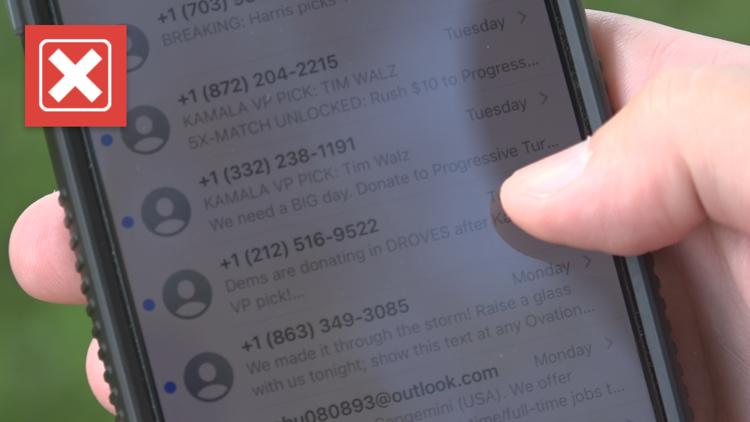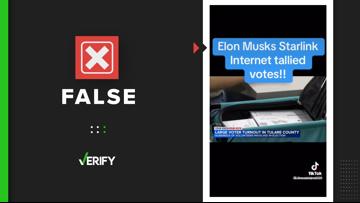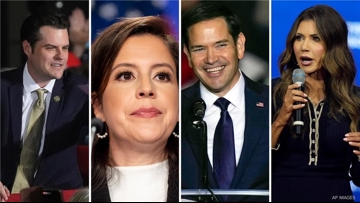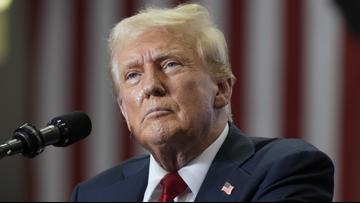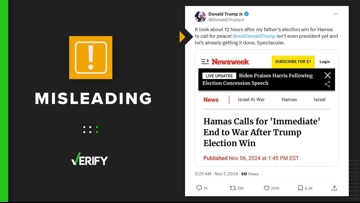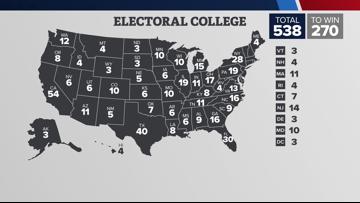BARTOW, Fla. — It has become a daily doom scroll for Steve Giglio to sort through the deluge of text messages asking for political donations.
“It’s just one after the other,” Giglio said, showing VERIFY the 10 back-to-back messages he’d received just that morning. “Like, I’ve actually missed personal text messages as I’m scrolling through again.”
He isn’t alone.
Americans received a record 15 billion political texts in 2022, according to call-blocking service "RoboKiller,” with even more expected by the time the current election cycle wraps up.
But Giglio noticed many of these requests don’t appear to come directly from the candidates’ campaigns but instead from groups with names like “Democratic Power” or “Patriots for American Leadership.”
He contacted VERIFY wondering if these requests are legitimate.
THE QUESTION
Are groups soliciting political donations always giving that money to the candidates they claim to support?
THE SOURCES
- Campaign Legal Center (CLC)
- OpenSecrets
- CharityWatch
- FBI
- AARP
- Better Business Bureau (BBB)
- Federal Election Commission (FEC) campaign finance data
- ‘Proposal to Attack Scam PACs’ 2016 FEC memorandum
- ‘How Scam PACs Cheat Us’ report from Office of U.S. Rep. Katie Porter, D-Calif.
- H.R. 6893 Scam PAC Act
- Ciara Torres-Spelliscy, Stetson University election law professor
THE ANSWER
No, groups soliciting political donations do not always give that money to the candidates they claim to support. These groups have become known as so-called "scam PACs."
WHAT WE FOUND
Political action committees, known as PACs, are tax-exempt organizations that collect contributions to give to candidates or various causes, according to the Federal Election Commission (FEC), the agency charged with enforcing campaign finance law.
While the term “scam PAC” is not legally defined, the FEC has identified “scam PACs” as, “political committees that collect political contributions … but which spend little to none of the proceeds on the political activity benefitting the candidate.”
According to the Campaign Legal Center, a federal campaign finance reform watchdog group, so-called “scam PACs” pretend to fundraise for major candidates or issues while secretly diverting almost all of their donors’ money back into fundraising or the fraudsters’ own pockets.
The FBI declared “scam PACs” were on the rise in 2021.
How ‘scam PACs’ defraud donors
“Scam PACs” tend to rely on urgent messages and names of well-known politicians to request donations, FEC commissioner Ann Ravel wrote in a memo to the agency in 2016. Others latch onto specific issues like veterans’ rights, according to OpenSecrets, a D.C.-based nonprofit that tracks data on campaign finance.
The way the request is portrayed makes it appear as though it will go to help elect or defeat a candidate or support a specific cause, but large chunks of money are instead spent on fundraising campaigns, with the rest allocated to salaries, administrative costs and overhead, according to OpenSecrets.
VERIFY reviewed FEC campaign finance data showing groups purporting to raise money for candidates, instead pocketed most of it.
In one such instance, federal records show a group called “Democratic Power” funneled more than half of the $2.2 million it raised since the start of 2023 back into operating expenses. Similarly, a group calling itself “Democrats United” has given none of its $2.8 million raised to any candidates.
The Campaign Legal Center and OpenSecrets have uncovered dozens of examples in recent years impacting donors on both sides of the aisle.
The CLC filed complaints in April with the FEC about two PACs using audio of former President Donald Trump’s voice to “con unsuspecting Americans out of millions of dollars that they were falsely told would be used to support Trump and Republicans.”
The groups were identified as “Patriots for American Leadership” and “Campaign for a Conservative Majority.”
But neither group used donors’ money to support Trump or other Republican candidates, according to the CLC, instead diverting nearly all funds to the PACs’ operators or on even more fundraising.
What’s being done about it?
The FEC has repeatedly told Congress it cannot effectively crack down on “scam PACs” until loopholes in federal campaign laws are closed.
“Unless Congress takes action and gives the FEC the tools to regulate scam PACs, we can expect this problem to grow,” FEC Commissioner and former chair, Ann Ravel, wrote in a 2015 editorial.
Federal election laws provide political committees “with great leeway on how they use the funds” they receive from donors, Ravel and fellow commissioner Ellen Weintraub wrote in a 2016 memo to the commission.
Adding to the confusion, according to Stetson University election law professor Ciara Torres-Spelliscy, is a 2016 court decision allowing PACs to use a candidate’s name on free speech grounds.
“It essentially gives lying First Amendment protection,” Torres-Spelliscy told VERIFY. “I think the scam PACs get a lot of mileage out of these First Amendment rulings, which give them a lot of cover.”
The FEC published a series of legislation recommendations in 2018, which included placing limits on how committees could spend donations.
A subsequent bi-partisan bill in Congress to crack down on political fundraising scams called the “Stop Spam PACs Act” has not gained momentum. The proposal would empower the FEC to shut down fraudulent political action committees.
“Even when there are bipartisan solutions to problems plaguing the interests of both parties, there is apprehension and distrust that prevents progress,” according to this report. “How Scam PACs Cheat Us” from the Office of U.S. Rep. Katie Porter, D-Calif., who co-sponsored the “Stop Spam PACs Act.”
“Perhaps some elected officials fear that a crackdown on scam PACs could prompt enforcement against sketchy fundraising techniques—like fake triple matches—that their own campaigns use.”
Torres-Spelliscy said while the FEC has been weak on enforcement, the Department of Justice has taken down a handful of individuals connected in recent years including two men who received seven to 10 years sentences in federal prison for operating a scam PAC that raked in millions of dollars.
How to protect yourself
Not all PACs are scams, CharityWatch cautions, and donors should remember that many legitimate nonprofit organizations and campaigns have affiliated PACs.
Torres-Spelliscy recommends doing some research before handing over your credit card information to a group asking for a political donation. She said it’s also a good idea to search the official candidate campaign committee or look for trusted intermediaries like ActBlue or PatriotPass.
You can also check how long a PAC has been around and where it spends its money.
Registered PACs are required to file quarterly reports with the FEC. The FBI recommends searching a group’s “disbursements” to see which vendors it’s using. Vendors associated with the operators of the group, or the same operator running multiple PACs can be an indicator of a scam, the agency warns.
Legitimate PACs generally spend less than a quarter of donations on fundraising, and most of the money goes to candidates and other political efforts, Andrew Mayersohn, a researcher at the nonprofit Center for Responsive Politics in Washington, told AARP.
AARP also warns to be suspicious if a PAC collects money through harder-to-trace payment sites like Paypal and to avoid a PAC that doesn’t ask a donor to confirm if they are at least 21 years old and not a foreign national, which is required.
“The political season is kind of chaotic enough,” Giglio told VERIFY. “The texts to me are just an unnecessary thing, and I just wish we could avoid that or figure out a way to control it a little bit better.”
The Better Business Bureau also warns scammers might try to get more than just your money through text messages by having you click a phishing link where they can steal your personal information. In other cases, scammers might invite you to participate in a poll or text your vote rather than voting in person or by mail.
Never click a link in a message unless you trust exactly where it's going and know that legitimate pollsters don't usually offer prizes for completing a survey, the BBB warns. Legitimate pollsters will never need information like birth dates, social security numbers or financial information. No state offers voter registration by phone.
How'd they get my number?
Even if you didn't give a campaign your phone number, chances are they might already have it.
Voter registration records, including your name, address, date of birth, party affiliation, phone number and email address, are public under Florida law and can generally be accessed by anyone.
Political groups are known to then purchase phone numbers, like when the Democratic National Committee announced in the leadup to the 2020 election it had made a national cell phone purchase of numbers "for every possible voter in all 50 states and the District of Columbia."
Federal rules say political campaigns or organizations do not need your permission to start texting you, and there's nothing you can do in advance to prevent them. The FCC only prohibits unsolicited political calls or texts to cell phones if they're sent using automated dialing or texting software.
However, you can still ask individual campaigns to stop — the FCC webpage says campaigns "should honor opt-out requests." But that only applies if the sender is a legitimate political campaign or group. If a text appears to be from a scam caller, then regardless of whether it's political in nature, it's best not to reply at all.

